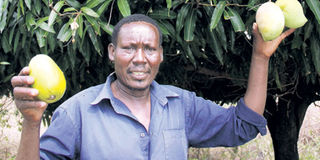Forget the rustlers, I’m growing mangoes

Fredrick Sang on his farm in Rokocho village, Elgeyo-Marakwet County. PHOTO | JARED NYATAYA
What you need to know:
- He now has over 250 trees of different fruits. Some 150 of them are mangoes, 100 are orange and 60 are paw paws.
- Kerio Valley Development Authority (KVDA) plans to build a mango processing plant as more pastoralists in the region turn to horticulture as an alternative source of income
Cattle rustling in Kerio Valley has made livestock rearing a nightmare for many farmers. After the rustlers strike, farmers often have to start from scratch, having lost all their animals.
Tired of losing their animals to the criminals, the farmers are now turning to other forms of agri-business, in particular crop farming. Fredrick Sang is among the farmers in Kerio Valley, who have ditched livestock farming for mango cultivation.
“Crops have no value to raiders. Their interest is animals, which are the main cause of armed conflicts among pastoralists in the region,” says Sang, who has found solace in horticulture and is reaping better returns.
He invested Sh100,000 in the business, with Sh40,000 going to providing piped water, Sh30,000 to seedlings and the rest to labour.
“Every investment has its own challenges but hard work and patience pays. I had to sacrifice a lot sourcing for water in this rough and rocky geographical terrain,” adds Sang, who plans to increase acreage under cultivation of the crops.
He now has over 250 trees of different fruits. Some 150 of them are mangoes, 100 are orange and 60 are paw paws.
Each generates an average of Sh1,000 during the peak season. He sells his produce in Iten, Kabernet, Eldoret, Kisumu, Nakuru, and Nairobi.
The farmer recently received a boost for a guaranteed market for mangoes when he entered into contract with a wine manufacturing plant.
“The buyer offers an average of Sh50 per fruit on the farm. This is better than selling the produce at various markets,” says Sang, who has no regrets about going into mango farming.
Together with other farmers in the region, they have formed Rokocho Horticultural Farmers Association, through which they sell their produce.
“We have partnered with the Horticultural Crops Development Authority and the Ministry of Agriculture. They train us on modern production techniques, including grating of plants for better yield and returns,” says Sang, who has been growing the crops for about 10 years now.
The father of six earns enough revenue from the investment to meet the basic needs of his family and pay his children’s school fees.
“I lost a lot of animals to cattle rustlers before trying my luck in horticulture, which has transformed my life for the better,” says Sang, whose five-acre firm is located in semi-arid Rokocho village, Elgeyo-Marakwet County.
Jackson Kaino is another fruit farmer in the region. The farmer, based in Chesoi, Elgeyo Marakwet County, grows mangoes on three acres.
He gets Sh15,000 selling the produce during the peak season. The fruit is harvested four times a year.
“Reaching the market is a problem because of poor roads,” he says.
Kerio Valley Development Authority (KVDA) plans to build a mango processing plant as more pastoralists in the region turn to horticulture as an alternative source of income.
KVDA managing director David Kimosop said the authority has partnered with Dutch firm ABAC to construct the factory to save the farmers from exploitation by middlemen who offer low prices.
“Organic juice will be extracted from the fruit. This can be used as a flavour for ice cream or even yoghurt,” said Mr Kimosop.
– Additional reporting by Copperfield Lagat





